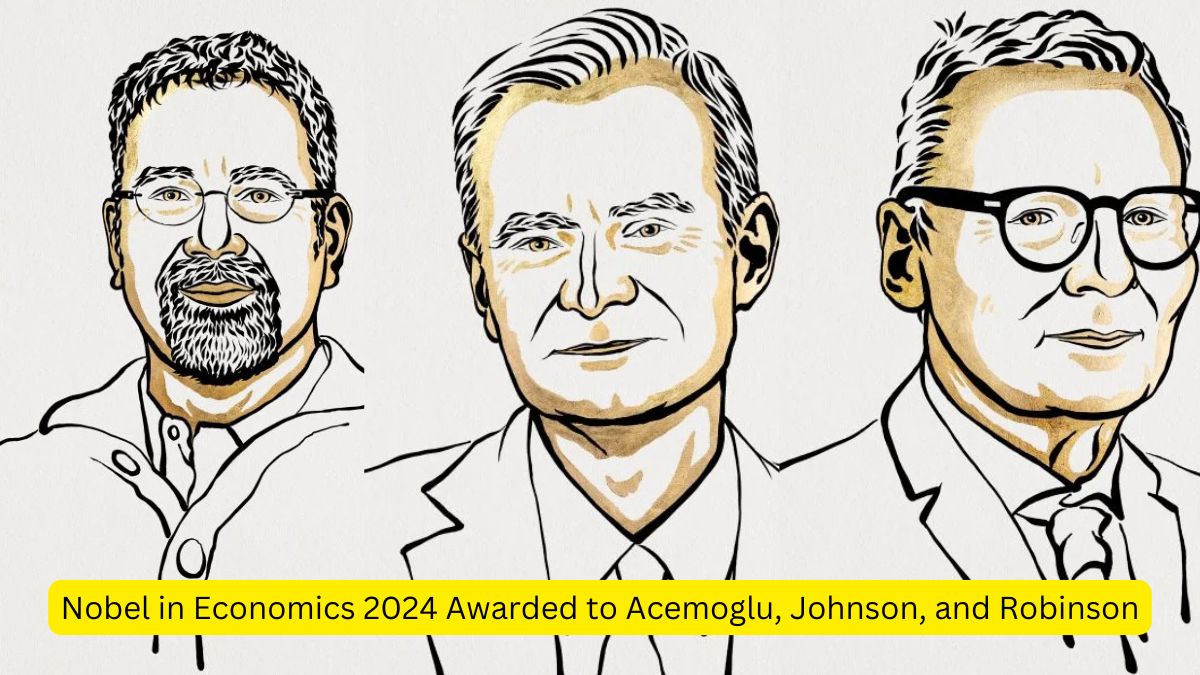2024 Nobel laureates in the economic sciences are Daron Acemoglu, Simon Johnson and James Robinson – have demonstrated the importance of societal institutions for a country’s prosperity. Societies with a poor rule of law and institutions that exploit the population do not generate growth or change for the better.
Details
Winners Name
- Daron Acemoglu
- Simon Johnson
- James A. Robinson
Topic : For studies of how institutions are formed and affect prosperity
Importance of Institutions for Prosperity
- The laureates have shown that societal institutions and the rules and norms that govern society play a crucial role in determining a country’s prosperity.
- Societies with poor rule of law and exploitative institutions tend to stagnate economically, while those with inclusive institutions promote growth and development.
Impact of Colonisation
- Their research highlights the different ways in which colonization impacted institutional development in various regions.
- In some colonies, the colonizers exploited the local population and established extractive systems to serve their own interests.
- In others, they created inclusive political and economic systems that allowed for the long-term prosperity of the population, particularly for European migrants.
Long-Term Effects
- These differences explain why some former colonies that were once rich are now poor, and vice versa.
- Countries that adopted inclusive institutions during colonization were able to achieve prosperity over time, while those with extractive institutions remained economically weak.
Institutional Traps and Challenges
- Countries with extractive institutions often find themselves trapped in a cycle of low economic growth.
- Inclusive institutions would bring long-term benefits to the entire population, but extractive institutions favor short-term gains for those in power.
- Political leaders in these systems often lack credibility in their promises of reform, causing a lack of trust and perpetuating the status quo.
Democratization and Revolution
- The laureates’ research also provides insight into why democratization sometimes occurs.
- When faced with the threat of revolution, ruling elites may be forced to choose between making credible economic reforms or transferring power through democratization.
- Often, to avoid violent upheaval, they opt for the latter and establish democratic systems.
Significance
- Reducing the vast differences in income between countries remains a critical global challenge. The laureates’ work demonstrates the fundamental role that societal institutions play in achieving sustained economic prosperity.
Committee Statement
- Jakob Svensson, Chair of the Committee for the Prize in Economic Sciences, emphasized the importance of their work, noting, “Reducing the vast differences in income between countries is one of our time’s greatest challenges. The laureates have demonstrated the importance of societal institutions for achieving this.“
Their Explanation on Income Disparities and Institutions
Global Income Inequality
- The richest 20% of countries are about 30 times wealthier than the poorest 20%.
- These income gaps have persisted over the last 75 years and widened over the past 200 years.
New Approach to Understanding Economic Differences
- The laureates Acemoglu, Johnson, and Robinson have pioneered a new research tradition by examining the historical roots of economic disparities, particularly through the lens of colonialism.
- Their work shows how colonial strategies created extractive institutions that persist in many low-income countries today.
Institutions and Wealth
- Their research underscores that political institutions fundamentally shape national wealth.
- The laureates’ dynamic model shows that ruling elites make strategic decisions about political reforms, such as expanding the electoral franchise, in response to threats.
Inclusive Governments and Development
- Their model suggests that more inclusive governments foster economic development, and increasing evidence supports this idea.
About Winners
Daron Acemoglu
- Daron Acemoglu, born 1967 in Istanbul, Türkiye.
- PhD 1992 from London School of Economics and Political Science, UK.
- Professor at Massachusetts Institute of Technology, Cambridge, USA.
Simon Johnson
- Simon Johnson, born 1963 in Sheffield, UK.
- PhD 1989 from Massachusetts Institute of Technology, Cambridge, USA.
- Professor at Massachusetts Institute of Technology, Cambridge, USA.
James A. Robinson
- James A. Robinson, born 1960.
- PhD 1993 from Yale University, New Haven, CT, USA.
- Professor at University of Chicago, IL, USA.
Prize amount
- 11 million Swedish kronor, to be shared equally between the laureates.
The Royal Swedish Academy of Sciences
- The Royal Swedish Academy of Sciences, founded in 1739.
- It is an independent organisation whose overall objective is to promote the sciences and strengthen their influence in society.
- The Academy takes special responsibility for the natural sciences and mathematics, but endeavours to promote the exchange of ideas between various disciplines.
| Summary/Static | Details |
| Why in the news? | Nobel Economics Prize Winner 2024 |
| Awarded by | The Royal Swedish Academy of Sciences |
| Winners | Daron Acemoglu, Simon Johnson, and James A. Robinson |
| Reason for Award | For studies on the formation and impact of institutions on prosperity |
| Significance | – Addressing global income inequality is crucial, with societal institutions playing a fundamental role in achieving economic prosperity and reducing income disparities. |
| New Approach to Economic Differences | – Their research, particularly on colonialism, highlights the historical roots of economic disparities and shows how colonial strategies created extractive institutions in many low-income countries today. |
| Institutions and Wealth | – Political institutions shape national wealth, with inclusive institutions fostering economic development. |
| Prize Amount | 11 million Swedish kronor, shared equally among the laureates. |




 List of Dadasaheb Phalke Award Winners f...
List of Dadasaheb Phalke Award Winners f...
 Mumbai to Host Prince William’s Earthsho...
Mumbai to Host Prince William’s Earthsho...
 What Is Bhavya Bharat Bhushan Award? Sad...
What Is Bhavya Bharat Bhushan Award? Sad...








